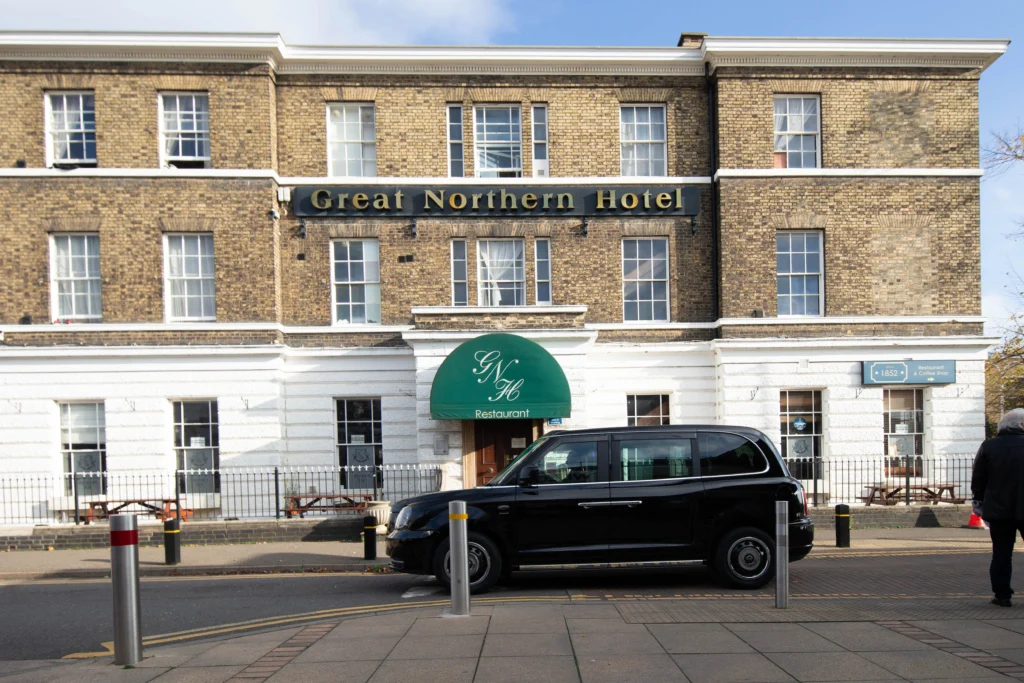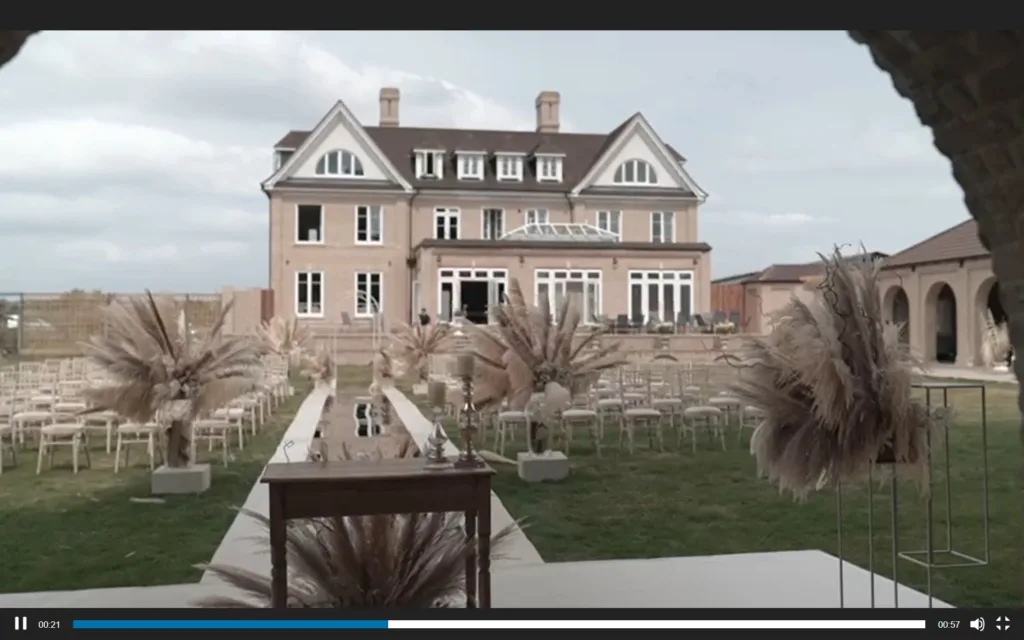News
Green light for Wisbech and Peterborough hotels to house asylum seekers

Twenty-one guests of the Rose and Crown, Wisbech, can stay, a High Court judge ruled today.
He also suggested Fenland District Council had not prepared adequately after he dismissed their application for an injunction to stop a Wisbech hotel being used for asylum seekers.

Inside the Rose and Crown Hotel, Wisbech
Mr Justice Holgate felt that only a “generalised point is made with very little detail” in respect of the council’s claims about the potential of migrant exploitation.
And he was also dismissive of the council’s objection to the Rose and Crown in particular being used for accommodating asylum seekers.

In Peterborough it is full steam ahead for continued use of the Great Northern hotel for housing asylum seekers.
“No real link has been put forward between a problem that exists on a national scale and the accommodation of asylum seekers in a hotel,” he said.
Fenland Council had argued the hotel had been turned into a hostel – and so therefore was in breach of planning permission.
But that objection was swept aside.
Mr Justice Holgate said he had studied the council’s objections but concluded that “the application for an interim injunction should be refused”.
The council’s lawyers had used terms such as “significant deprivation”, “organised crime” and a “history of migrant exploitation” as reasons why they felt Serco should be denied a contract to house asylum seekers at the hotel.
And in Peterborough it is full steam ahead for continued use of the Great Northern hotel for housing asylum seekers.

Asylum seekers have arrived at the 3-star Great Northern Hotel, Peterborough, to be greeted – online and on TV – by a barrage of criticism from MP Paul Bristow.
The city council withdrew its bid for an injunction after deciding it didn’t want to spend “any more taxpayers’ money than was necessary”.
https://twitter.com/paulbristow79/status/1592930027553034240
A Home Office statement said: “The number of people arriving in the UK who seek asylum and require accommodation has reached record levels, placing unprecedented pressures on the asylum system.
“The Home Office and partners identify sites for accommodation based on whether they are safe and available.
“While we accept that hotels do not provide a long-term solution, they do offer safe, secure and clean accommodation, and we are working hard with local authorities to find appropriate accommodation during this challenging time.”
Council disappointed after losing asylum seeker hotel injunction
This is an extract from a press release put out tonight by Fenland District Council.
Fenland District Council Leader, Cllr Chris Boden, said: “We are obviously disappointed that we were unsuccessful in securing an interim injunction to stop the use of a local hotel as a hostel by accommodating asylum seekers.
“We remain deeply concerned about the housing of asylum seekers there, as there has been no consideration of the potential risks these vulnerable people will be facing or the significant amount of support they will need.”
Cllr Steve Tierney, District Councillor for Medworth, Wisbech, said: “We learnt of the Rose and Crown’s closure on 4th November and contacted SERCO who confirmed our concerns, asylum seekers were to be placed.
“We immediately took legal action and proceedings began.
“Sadly, SERCO placed some Asylum Seekers into the hotel that evening and 21 individuals are currently in residence.
“We had hoped the injunction today would have made SERCO find alternative accommodation, but the judge ruled otherwise.
“On a more positive note, we believe we have had some success. During the Court case it was included in the Council’s court papers that SERCO had previously stated that no asylum seekers would be placed in Wisbech under the much larger long term Asylum Dispersal Scheme.
“As far as we know, Wisbech will be the only town in the country to receive that assurance. So, while we are extremely disappointed in the outcome, we have fought it as best we are able and have, at least, been given that assurance.”
Cllr Samantha Hoy, the Council’s Cabinet Member for Housing, added: “We believe we had a strong case to take to court. Our case was materially different to that of other councils who had previously been unsuccessful. Other Councils had a month’s notice, and we received no notice at all.
“Furthermore, we know, and SERCO had already recognised, that Wisbech is an inappropriate place to house asylum seekers because of the exceptional and recognised problems in the area, including illegal gangmasters, human trafficking and modern-day slavery.
“We were also concerned about the effect on availability of local services and potential issues of social cohesion.”
EDITOR, JOHN ELWORTHY, WROTE ABOUT SERCO CONSIDERING WISBECH AND FENLAND FOR ASYLUM SEEKERS ON SEPTEMBER 9TH THIS YEAR.
Here is his report from that date:
Fenland District Council signalled a head-on clash with Government over plans to house asylum seekers in March, Whittlesey, Chatteris, Wisbech and numerous villages.
“I am absolutely sick and tired of government making stupid decisions and passing the problem down the line to people who didn’t make those stupid decisions,” Cllr Steve Tierney told Cabinet colleagues.
Cllr Jan French said that it was “very worrying if we are forced to take asylum seekers in Fenland”.
She said there was a great shortage of housing “and we need to be looking after our own people first”.
Council leader Chris Boden said the new government proposals were “a matter of serious concern” and the impact on Fenland needed to be considered.
Cllr Boden suggested that a full dispersal scheme to all parts of the UK was proposed and “so long as you have 1,000 illegal immigrants coming across channel on a daily basis, we will be expected to take two every single day”
Cabinet heard of the potential financial and social implications of the Government’s Asylum Seeker Dispersal programme to the extent that it will relate to Fenland
Councillors were told that the Home Office has awarded a contract to Serco to manage “sundry asylum seeker related responsibilities” in the East of England.
Serco has responsibility locally to manage the Home Office’s Asylum Seeker Dispersal Programme.
“Based on a full dispersal approach to allocations across the country, there will be a requirement to house asylum seekers in Fenland by the end of next year,” said a report to Cabinet.
“Serco are expected exclusively or overwhelmingly to source accommodation for these asylum seekers from the private rented accommodation sector.
“If asylum seekers’ applications for asylum are unsuccessful, or they breach their conditions of stay in the UK as an asylum seeker, whilst the Government will signpost them towards repatriation, the asylum seeker will be left without recourse to public funds”.
The report said: “This asylum seeker dispersal policy is being imposed upon Fenland District Council without our agreement.”
Councillors agreed for officers to estimate “the risks to FDC inherent in this policy” and to authorise representations to MP Steve Barclay and Prime Minister Liz Truss.
“If asylum seekers’ applications for asylum are unsuccessful, or they breach their conditions of stay in the UK as an asylum seeker, whilst the Government will signpost them towards repatriation, the asylum seeker will be left without recourse to public funds,” said the report.
Officers said Fenland does not contain the community support networks seen in cities such as Peterborough or Cambridge to provide social support for asylum seekers.
“Fenland’s sub-standard and expensive public transport system would make access to such support networks very difficult if not impossible for asylum seekers,” the report said.
“FDC has been made aware that asylum seekers’ rights to accommodation, supplied by Serco, would be lost if their application for political asylum were to be unsuccessful together with any associated appeal.
“In that case, we are told, the asylum seeker concerned would be ‘signposted’ to repatriation facilities but could be left, potentially destitute, here in Fenland with no access to public funds.
“There is relatively tight, and increasingly expensive, private sector rented housing provision in Fenland. The impact of Serco’s plans on the private rented market are uncertain.”
Any proposal requiring the allocation of asylum seekers within Fenland has the potential to restrict properties available for other people in need of accommodation, says the council.
“It is possible that the consequential impact on supply could create further inflation in rents at a time when the cost of living is causing people to struggle,” said the report.
“There is a concern that the impact on housing supply for people already living in the area or wishing to relocate to Fenland may not have been adequately addressed.”
A major concern for FDC is that if people have their application for asylum rejected and are left without recourse to public funds.
“It is possible that this could constitute a significant problem in Fenland,” councillors were told.
“It is unclear whether the potential impact this could have on the area and local public funds has been adequately assessed.”
Cabinet accepted officers’ recommendation that “Fenland District Council does not support the Asylum Seeker Dispersal Scheme.
“It is imperative that allocations consider the existing or any newly created community support structures appropriate for the nationality and culture of the asylum seekers themselves.
“For example, it would be wholly inappropriate to place a practising Muslim asylum seeker in a property in a village with no access to a local asylum seekers’ support group, nor to an appropriate place of worship, nor to a shop selling Halal meat or foods with which they are familiar and with no practical means to afford public transport to access any such facilities.
“Until and unless the Government, and Serco, take into account the appropriateness of the locations where asylum seekers would be placed, the scheme remains fundamentally flawed and will be unsuccessful.”
The council agreed: “Government should be taking urgent additional action to stop illegal entry to the UK, to process asylum seekers’ applications far more expeditiously and to deport those people who have no right to remain in the UK.”
Cllr Sam Hoy said it was “frustrating” that the government had not consulted on the proposals.
She said Fenland has a “real shortage” of housing, both social and private, and she wondered if Serco would be buying or renting properties.
Her biggest concern, however, was managing those asylum seekers “signposted to leave” and how this would be managed.
Cllr Hoy said that it was evident the government did not want to continue to use hotels but the “elephant in the room” remained that ministers had not got to grips with immigration.
Cllr Boden said there were many things the government could do including “getting the border sorted out and taking stronger action to deter and return people”.
Processing needed to speed up and “to deport those with no right to be here
“And the government has to be more discriminating in where these asylum seekers will be dispersed to”.
He said it was “entirely inappropriate” for many to be dumped in villagers with no bus service or services to town.”
“Dumped in middle of nowhere is a recipe for absolute disaster not just for them but potentially for the local community,” he said.
Cllr Tierney said the government had put forward “the wrong policy and we should absolutely tell them”.




































![Councillor visit to ESCC (L-R: Councillor Geoffrey Seef, County Councillor for St Neots The Eatons [local councillor]; Rob Ashwell, chairman of ESCC; Cllr Alex Bulat Vice-Chair of Cambridgeshire County Council's Communities, Social Mobility, and Inclusion Committee). Credit to Cambridgeshire County Council.](https://www.cambsnews.co.uk/wp-content/uploads/2024/07/Councillor-visit-to-ESCC_cropped-400x240.jpg)
![Councillor visit to ESCC (L-R: Councillor Geoffrey Seef, County Councillor for St Neots The Eatons [local councillor]; Rob Ashwell, chairman of ESCC; Cllr Alex Bulat Vice-Chair of Cambridgeshire County Council's Communities, Social Mobility, and Inclusion Committee). Credit to Cambridgeshire County Council.](https://www.cambsnews.co.uk/wp-content/uploads/2024/07/Councillor-visit-to-ESCC_cropped-80x80.jpg)